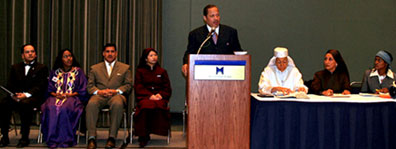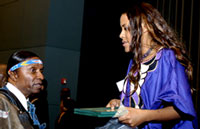
CHICAGO (FinalCall.com) – Expanding the understanding of the Nation of Islam, the Bridging the Families workshop February 25 during Saviours’ Day weekend celebration focused on a more mature inclusion of the members of the Original Nation in the mission.
“Many of us have an arrested idea of the Teachings of the Honorable Elijah Muhammad,” charged Seventh Regional Minister Rasul Muhammad, moderator of the insightful and emotionally charged workshop. “In our immaturity, we think this Teaching is good only for Black people.”

He briefly informed the workshop of the history of Latinos that were supporters of the Nation in the 1930s and the increasing Latino membership during the 1950s and 1960s, the establishment of a mosque in Spanish Harlem in New York City, and the assignment of Minister Juan to establish a mosque in the capital of Mexico. He also corrected the modern interpretation of the spectrum of the human family, saying that the Honorable Elijah Muhammad referred to the Japanese as the Brown man–not our Latino family, because they were, in fact, included in his references to the Black man.
Coordinated by Yo’Nas Da Lonewolf McCall-Muhammad, national director of the Indigenous Nations Alliance for the Millions More Movement, the workshop created a space for presenters to share their personal experiences and challenges, as many described, as “returning home” to the Nation of Islam.
Presenters included Dian Moy Muhammad, a third generational Chinese immigrant from Chicago; Atlanta resident A. Muhammad, Director of Global Youth Movement; Chicago student minister Abel Muhammad; Oakland, Calif. Prison Reform Ministry coordinator Theresa Muhammad; Los Angeles student minister Dwayne Christian Muhammad; Miami student minister Richard Muhammad; and Sister Yo’Nas Da. Mother Tynnetta Muhammad was the final and featured presenter.
“The basis of our unity is truth,” stressed Sister A. Muhammad, who illustrated the enemy’s clear intent to divide the human Indigenous family through language. “We are members of the same family, and if we do not see that, we are yet blind to Him who came to save us.”
Min. Abel charged the audience with his firm declaration that the emphasis on “Blackness” threaded throughout the Teachings did not frighten him away from embarking on his journey to become a Registered Member of the Nation of Islam.

“The bridge was there. Even though the label said ‘Black,’ whenever I took the medicine, it worked for me, too,” he said. “The Honorable Elijah Muhammad said that Black is universal, so this is my home, too. I come from the family–the Asiatic Black man.”
The presentations were punctuated by passionate and humorous, commentary by Min. Rasul that further enlightened the significance of the workshop and the mandate to embrace all members of the Indigenous family.
“They are not here to convert to genuflect to you (descendants of enslaved Africans). They are part of the Master’s divine and strategic plan to save and redeem us,” he insisted. “They are our help, not only our family, and they love you even though you don’t love yourself.”
In her remarks, Mother Tynnetta encapsulated the spirit of all of the previous presenters. “We draw our life blood, not from our religion, but who we are,” she taught. “Within the Black man is a clot of blood that represents all of us.”
She shared that the Honorable Elijah Muhammad instructed her to move to Mexico and raise their children there, as well as mentioned his meeting with Hopi chiefs–all of which he was laying the foundation for the unification of the Original Nation.
In a special presentation that concluded the workshop, a group of Latino Muslims revealed a new product–a coffee blend that was organically grown coffee from the highlands of Chiapas, Mexico–which manifests the potential progress and positive development that unity can spark.
“We are so proud to bring this product from our native Mexico, which is wealthy in agriculture, yet our people are suffering,” Los Angeles resident Antonio Muhammad shared, choking back his tears. “This will bring a solution to the poverty of our people. Your family in Mexico receives you.”












